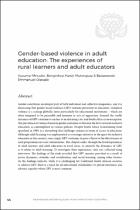Gender-based violence in adult education: The experiences of rural learners and adult educators

View/
Date
2022Author
Mncube, Vusumzi
Mutongoza, Bonginkosi Hardy
Olawale, Babawande Emmanuel
Metadata
Show full item recordAbstract
Gender constitutes an integral part of both individual and collective uniqueness, and it is
distressing that gender-based violence (GBV) remains persistent in education. Gendered
violence is a scourge globally, more particularly for educational institutions – which are
often imagined to be peaceable and immune to acts of aggression. Around the world,
instances of GBV continue to surface at an alarming rate, and South Africa is no exception.
The prevalence of violence based on gender continues to threaten the drive towards inclusive
education, as contemplated in various policies. Despite South Africa transitioning from
apartheid in 1994, it is disturbing that challenges remain in terms of access to education.
Although adult learning was implemented as a strategic initiative in the quest for inclusive
education in this country, worryingly, GBV continues to pose a threat to the effectiveness of
such programmes in rural communities. This chapter seeks, through the lived experiences
of adult learners and adult educators in rural areas, to unearth the dynamics of GBV
as it relates to adult learning. To investigate their experiences, data was collected using
interviews. The findings of the study revealed that GBV remains prevalent as a result of
power dynamics, attitudes and socialisation, and social learning, among other factors.
As the findings indicate, while it is challenging for traditional South African societies
to address GBV, there is a need for all educational stakeholders to spread awareness and
advance equality where GBV is most common.
